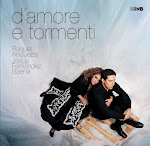But unlike its counterparts, the aria was a child of the Renaissance and an immediate beneficiary of opera (an Italian invention), with its classical themes of passion, unrequited love/lust, and besotted lovers providing inspiration for many a composer and performer.
Recordings with programs made up of entire early-Italian baroque song are commonplace in today’s market, with selections dating back at least four decades. There are some notable ones, mainly associated with famous names and duos, but few of the lesser-known ensembles come to mind when summoned.
I became aware of soprano Raquel Andueza and theorbist Jesús Fernández Baena as a duo just recently. On receiving a copy of their recording D’amore e tormenti (NB Musika) I had an idea of what to expect as far as Andueza was concerned (I’d been bowled over already by her gorgeous voice and impeccable musicianship in recordings with Private Musicke and More Hispano). Yet her CD with Baena is something quite special.
The duo chose a varied program of laments, ground basses, and solo theorbo pieces, primarily works that are well-known and performed often. However, the sense of intimacy between the Andueza and Baena is both unique and palpable.
Pieces that I’ve heard over and over again are given life through fresh interpretation, often exuding a feel that’s more improvised than anything else.
Andueza has a seductive tinge of melancholy in her singing that draws you in, not to mention a wide palette of colors she uses to great effect. Baena is as fine a theorbist as I’ve had the pleasure of listening to on recording. His interpretation ofJohannes Kapsberger’s Chiaconna exhibits striking musicianship, as does his excellent accompaniment (full of creative textures).
Speaking of chiaconna’s, it was lovely to discover Ferrari’s Voglio di vita uscir (“I would depart this life”) having only been familiar with Monteverdi’s setting over a similar bass line.
Although I hesitate to draw comparisons, I have to admit that the duo reminds me of the renowned collaboration between Emma Kirkby and Anthony Rooley, whose powerful connection was evident in their many recordings. Whereas Kirkby and Rooley were the definitive performers of early song for their generation, Andueza and Baena are surely at the top of the list for theirs.
BERNARD GORDILLO, www.bernardgordillo.com


No hay comentarios:
Publicar un comentario